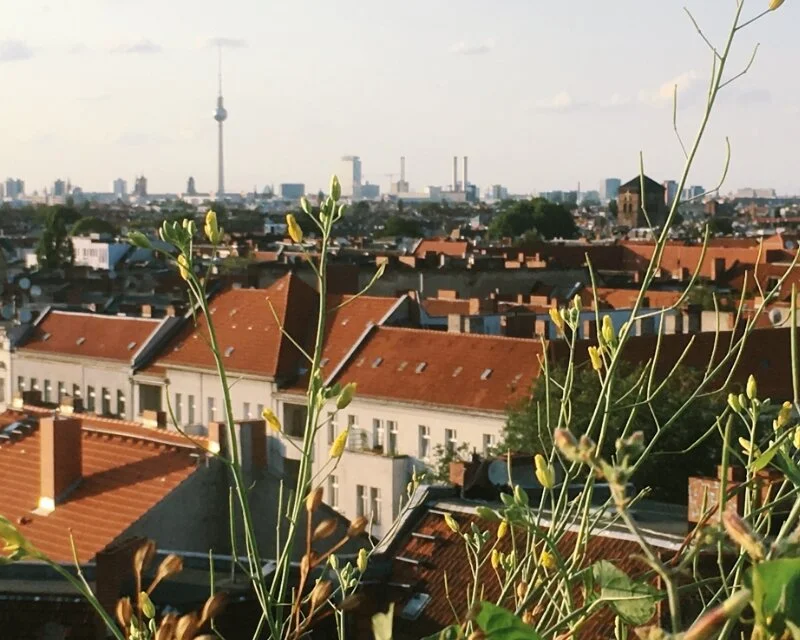Klunkerkranich
by Susan Weber
To win the war we bombed Berlin to smithereens. Lunatic dreams of world domination were crushed to dust and rubble. Women outlived men by the millions in eviscerated Germany. In Berlin, women were conscripted by the victors to break up chunks of wreckage. Some called them Trümmerfrauen, women of the ruins. They attacked the debris with sledge hammers, pick-axes, and winches. They dumped it into bomb craters or hauled it off to make new bricks.
We sit at a rough planked table in a roof top bar, Klunkerkranich, named for the mighty cranes that punctuate the skyline of Berlin. One seems close enough to touch. The locals gather here to have a beer and watch the sunset after work. The place spans the upper deck of a parking garage attached to a multi-storied mall. Decor is homespun. Giant burlap daisies twirl on stovepipe stems. Colored bulbs criss cross the sky. Variegated skin-tones and languages contribute to the vibe.
Waist high wildflower planters show off the birds eye view. Slant roofs, flat roofs, chimneyed and steepled roofs fan out in all directions. Over by Alexanderplatz stands the TV tower built in the sixties by the East Germans. It’s the EU’s third tallest anything. Last week, waiting underneath the tower for the train, a widower suggested that we climb up there for the thrill of a lifetime. The Reichstag building on the river pre-dates World War II. In 1933 it was damaged by mysterious fire. The German parliament surrendered its power to Hitler in the opera house across the Spree.
Churches, town halls, revered museums rise above the residential plane. We locate our apartment just beyond Rathaus Neukölln. The ghost of the wall torn down between 1989 and 1991 haunts the view. That horror took some time to deconstruct. With boots on the ground a person can see where the wall once stood. Conscientious citizens have set bricks flush with the pavement that trace the path of the erstwhile wall. Where the line is interrupted by a newer build, it faithfully continues on the other side.
I visited Berlin as a student when the wall still stood. My American passport rendered me invisible to border guards. I was too young to grasp the concept of a federal prison that incarcerated one hundred percent of a population. That last is not entirely accurate. Retirees were free to leave their life savings behind and flee to the west.
Evening breezes lift the August heat. We breathe again here on the roof, pondering at will. I’ve lived long enough to grasp endangered freedom, even when I look around and see no walls. It’s personal because I’ve bought the narrative that keeps me silenced. I don’t stand up to share what I know. But art and women have their way with dust and rubble, making space for the yet to be. Writing is its own defiance. For now, I build my words.
Photo Susan Weber CC BY-SA 4.0
